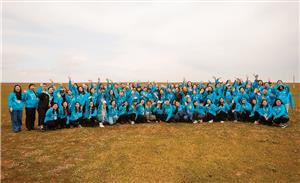- Main page
- News
Dream bigger, the sky is not the limit!
4/20/2022
Space exploration and the development of space technology represent an entirely new and highly specific area of human activity. The space activities of States affect the interests of virtually all countries owing to their global nature. Outer space differs from land, sea, and airspace in that it cannot be divided into zones during its use by States. While in flight, spacecraft inevitably pass through all layers of outer space as they move away from Earth and orbit over many different national territories. This happens both because of the laws of space flight itself and because of the Earth's rotation around its own axis.
It is now clear that the time is approaching when space technology will create new, ultra-fast means of transportation will be used to explore the Earth's interior and, finally, for human penetration into other planets. The prophetic words of the great Russian scientist Konstantin Tsiolkovsky are coming true, that man will gradually conquer all the circumsolar space.Space activity is one of the most complex types of activity, and its strong orientation towards broad international cooperation contributes significantly to global processes.
Kazakhstan possesses a huge potential for the successful development of space activities in light of the changing conditions both domestically and globally. The unique potential of space equipment, space systems, and international cooperation in space exploration and applications, combined with the country's space infrastructure and highly skilled personnel, provide a solid foundation for Kazakhstan to strengthen its position in world aeronautics. The world's first and largest cosmodrome, Baikonur, a unique facility with no equivalent in the world, is located in Kazakhstan. The presence of a cosmodrome testifies to the sophistication of a state and raises its authority in the international arena.International co-operation in space activities is very important to Kazakhstan, as the country has a large number of space industry projects to develop, and the government allocates certain funds for this purpose. Kazakhstan is making concerted efforts toward the development of its space industry.
Competitive space technology is being successfully developed for the benefit of Kazakhstan. A long-term program for the development of space activities in Kazakhstan is under preparation. Highly qualified personnel are essential for the further successful development of space activities.Kazakh National University named after al-Farabi contributes to the development of space technology. Al-Farabi Kazakh National University contributes to the study of the space industry and the training of specialists in the field of space research, with UniSat, a special project for girls (Unisat Nano-Satellite Educational Programme for Girls). From March 21 to March 31, 2022, more than 150 girls from Kazakhstan, Kyrgyzstan, and Uzbekistan participated in the unit educational program to assemble, design, and launch three cutting-edge nano-satellites into the stratosphere unit is an educational program created by UNICEF together with the Science and Technology Park at the Al-Farabi Kazakh National University to develop knowledge among girls on nanosatellite design and improve teamwork, public speaking, and effective time management skills.
Temirbaev Amirkhan Adilkhanovich, speaking to the participants, stressed the importance of the project and expressed the hope that this joint project will contribute to the further development of STEM education for girls in Kazakhstan and set an example to transform the experience in other countries.During the 10-day UniSat practical marathon, the participants learned how to design, engineer, program, and assemble spacecraft. They were able to visit a center for space technology and remote sensing. Under the guidance of mentors, the girls designed nanosatellite shells using 3D modeling and printed them on a 3D printer. The participants also programmed the UniSat nanosatellite subsystems themselves and tested them in a laboratory environment before launch.
"Today's launch is symbolic. It demonstrates the limitless potential of Central Asian girls and women. Their ability to push the boundaries of science and technology. We believe that the results of the UniSAT program will bring about a cosmic change in society," commented Arthur van Diesen, UNICEF Representative in Kazakhstan, on the participation of girls from different countries in the international project.
The UniSat program is supported by the Dubai Cares International Education Foundation, Clé de Peau Beauté brand, and philanthropist Mrs. Nazanin Alakija.
Dana Baytukaeva,
UniSat Project Ambassador,
Senior Lecturer of the International Law Department
Faculty of International Relations of Al-Farabi Kazakh National University

